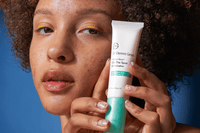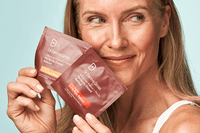Myth busted: Yes, your oily skin does need a moisturizer
9 minutes

Applying moisturizer to oily skin may seem like overkill. After all, if skin is already overproducing oil, why would it need more moisturizing assistance, you might wonder. And if your oily skin comes with a side of acne, you may worry that adding moisturizer to your complexion will only amplify your number of breakouts. But we’re here to tell you that not only does oily skin need moisturizing daily, regularly skipping a topical moisturizer can actually make skin even oilier.
The causes of oily skin
Hormones — surprise, surprise — have a lot to do with whether skin tends to be on the oilier side. Hormones also impact the quality of oil that your body produces (more on that later). Your environment can lead to oily skin as well. Hot, humid weather triggers sebum production in skin. If you’re stressed (about the hot, humid weather or about something else), your body may react by pumping out more sebum. And don’t forget that Mom and Dad (aka genetics) could also make you predisposed to having an oily complexion.
All of that said, oily skin can also come from you in a more immediate and direct way — specifically, you not wearing moisturizer. What many people don’t understand is that sebum is actually your friend, not foe. That natural oil helps keep your skin supple and the skin barrier in good condition. When the skin barrier is ruptured, dirt and pollution can easily slip in, irritating the complexion and triggering inflammation. Skin hates that. So when you decide to teach your acne who’s boss by withholding moisture from your skin, your body reacts by producing even more oil in an attempt to override your poor choice. It becomes a battle of wills, but spoiler alert: Your skin always gets its way, and you’ll be stuck in an endless loop, producing more oil than a rig in Texas.
Acne and oil: Quality over quantity
As difficult as it may be to believe, some people have extremely oily skin and rarely get so much as a pimple. This is because oil, generally speaking, isn’t responsible for your blemish woes. However, oil quality plays a huge part in acne. In a perfect world, oil flows freely to the skin’s surface and does the job nature intended. But low-quality sebum is sluggish and thick. Oil’s path from production to skin surface is already a long and winding road in the best of times. If the oil is moving like concrete instead of like water, it’s a lot easier for it to get stuck, mix with dead cells and bacteria, and clog your pore. It’s difficult to change the quality of the oil your body is making (hormones being what they are), so a better plan is to manage the consequences by keeping oil production stable and pores clear.
But seriously, how can oily skin get dehydrated?!?!?
This is where things get a bit complicated. Although the two terms are used interchangeably, “hydration” and “moisture” are actually two different things. Hydration goes with water while moisture refers to oil. Many products sold as “moisturizers” contain ingredients that are humectants (for hydration, although they can also moisturize), as well as moisturizers (for moisture, duh). In very broad terms, humectants draw water into skin tissue while moisturizers prevent water from escaping via evaporation.
Your daily diet and the amount of water you drink can impact skin’s hydration levels, too. So if you’re not getting enough water internally and you’re also not applying anything topically to attract the moisture in the air to your skin, you can easily end up with a dehydrated complexion. Your skin can’t make something from nothing, you know? You have to help it out, which is where “moisturizer” (the blanket term) comes in. The humectant ingredients in your product, like hyaluronic acid, will suck water from the environment and use it to plump parched tissue right away.
Your skin can produce sebum for days, but that oily substance can’t provide the same skin benefits as a humectant, which is the reason your oily complexion can also be dehydrated, as strange as that may seem.
Skincare ingredients that are good for oily skin (and ones to avoid at all costs)
Here are four to try and one family to skip in your skincare for oily skin:
Oily skin loves
- Alpha hydroxy acid (AHA): You know AHAs (like glycolic and lactic acids) as chemical exfoliants, which is true. But they’re also humectants. That means that while they’re gently dissolving the bonds that hold dead cells to your face (and threatening to clog your pores), they’re also drawing water into your skin. It’s a pretty neat trick.
- Ceramides: These are another lipid that we already have in our skin. They’re often described as the mortar between the bricks that are your skin cells. They help reinforce your skin barrier to keep the tissue healthy and strong. Better barrier function is a key component to keeping acne at bay.
- Hyaluronic acid: This classic ingredient is a hydration staple. Come for the fact that each hyaluronic acid molecule absorbs 1000 times its weight in water; stay because hyaluronic acid makes skin so soft and elastic.
- Squalane: Typically derived from plants, squalane is a stable form of the lipid squalene (note the “e”) naturally made by our bodies to help lock in moisture. You’re probably making the connection between “lipid” and “oil” and saying that ingredient is a hard no for your oily skin. Don’t be so quick to judge! Squalane oil is noncomedogenic (read: it won’t clog pores), plus it’s been shown to have anti-inflammatory properties, so it can help reduce the redness and swelling that often accompany acne.
Oily skin hates
Occlusives: These ingredients, often prescribed for extremely dry skin, lay down like cement to prevent any drop of moisture from getting out of skin. Clogging pores is practically in a day’s work for ingredients like petrolatum, beeswax, silicone, or mineral oil.
Three excellent moisturizers for oily skin
They’re all oil-free, but that’s just the beginning.
Dr. Dennis Gross Hyaluronic Marine Oil-Free Moisture Cushion
Hyaluronic acid in this gel-cream formula combines with Japanese marine algae to replenish desiccated tissue. Additional aloe helps soothe skin. If you’ve wrung the moisture out of your acneic skin and now it looks red and irritated, this is a good place to start.
Dr. Dennis Gross Vitamin C Lactic Oil-Free Radiant Moisturizer
Lactic acid and squalane meet three forms of antioxidant vitamin C for skin that’s protected from free radicals and looks brighter and more even.
Dr. Dennis Gross Alpha Beta Daily Moisturizer
Alpha and beta hydroxy acids to help keep pore pathways clear, plus squalane and ceramides for skin health and hydration.
Shop All Products From This Story
Discover Dr. Dennis Gross Skincare for All Your Skincare Needs
For more skincare tips from the experts at Dr. Dennis Gross, check out our blog’s newest content today. Shop the collection of Dr. Dennis Gross bestselling skincare, backed by dermatologists.

Written By
Ben Gentzler
Ben Gentzler ha trabajado en la industria de la belleza durante 17 años, 10 de los cuales se dedicaron al cuidado clínico de la piel. Es un esteticista licenciado apasionado por la educación profesional líder en tratamientos de vanguardia en los mejores spas de todo el mundo y por la formación en la ciencia de la piel. Ben se ha capacitado directamente con el Dr. Dennis Gross, aprendiendo sobre lo último en cuidado de la piel y trabajando con sus clientes para ayudarlos a lograr su mejor piel.
Read More from Ben Gentzler
Written By
Ben Gentzler
Ben Gentzler ha trabajado en la industria de la belleza durante 17 años, 10 de los cuales se dedicaron al cuidado clínico de la piel. Es un esteticista licenciado apasionado por la educación profesional líder en tratamientos de vanguardia en los mejores spas de todo el mundo y por la formación en la ciencia de la piel. Ben se ha capacitado directamente con el Dr. Dennis Gross, aprendiendo sobre lo último en cuidado de la piel y trabajando con sus clientes para ayudarlos a lograr su mejor piel.
Read More from Ben GentzlerRelated Articles
-

acne, author-ben-gentzler, skin-and-deeper April 03, 2024 — 6 minutes
Hit It: Introducing The Dr. Dennis Gross Alpha Beta On The Spot Eliminator
by Ben Gentzler
-

author-ben-gentzler, pro-tips, retinol, skin-and-deeper March 25, 2024 — 5 minutes
How to Use Perfectly Dosed Retinol Pads Like a Pro
by Ben Gentzler
-

author-ben-gentzler, nutrition, skin-and-deeper March 20, 2024 — 9 minutes
Does Your Diet Make Your Skin Better?
by Ben Gentzler
Keep Reading
Mantente al día con los últimos consejos de nuestro equipo de expertos en cuidado de la piel.
Regístrese para recibir un resumen mensual de consejos para el cuidado de la piel, el bienestar y el estilo de vida.






